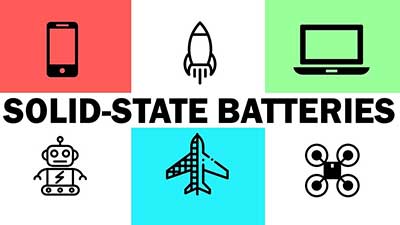Relevance: GS-3: Science and technology- developments and their applications and effects in everyday life
Key phrases: QuantumScape, Li ion batteries, Solid-state batteries, Dendrites, Deloitte, polymer separator, Cell energy density, Grid-scale battery storage system, Advanced Chemistry Cell (ACC) battery
Why in News?
- The lab at QuantumScape, a Silicon Valley start-up whose investors include Volkswagen and Bill Gates, is working on solid state batteries. Company asserted that its new novel battery technology could offer a safer, cheaper alternative to lithium-ion batteries
About Li ion batteries:
- The energy density of lithium-ion cells used in today’s mobile phones and electric vehicles is nearly four times higher than that of older-generation nickel-cadmium batteries.
- Lithium-ion batteries use aqueous electrolyte solutions, where ions transfer to and fro between the anode (negative electrode generally made of graphite) and cathode (positive electrode made of lithium), triggering the recharge and discharge of electrons.
- Despite improvements in technology over the last decade, issues such as long charging times and weak energy density persist.
- While lithium-ion batteries are seen as sufficiently efficient for phones and laptops, they still lack the range that would make EVs a viable alternative to internal combustion engine.
Issues with Lithium-ion batteries
- One major issue is that lithium metal is extremely reactive.
- The main form of lithium corrosion are dendrites, which are branched lithium structures that grow out from the electrode and can potentially pierce through the separator and on to the other end, short-circuiting the cell.
- In current lithium-ion batteries, in which the electrolyte is a flammable liquid, dendrite formation can trigger a fire.
- A study by Deloitte showed the top three considerations for consumers buying an EV are price, reliability, and cost to charge. Lithium-ion battery costs are currently high, forcing customers to not buy EVs.
Some salients aspects of Solid-state batteries
- According to researchers, a solid-state lithium-metal battery replaces the polymer separator used in conventional lithium-ion batteries with a solid-state separator.
- The replacement of the separator enables the use of a lithium-metal anode in place of the traditional carbon/graphite anode.
- The lithium metal anode is more energy-dense than conventional anodes, which allows the battery to store more energy in the same volume.
- The battery design is supposed to be ‘anode-free’ in that the battery is manufactured in a discharged state, and the negative electrode forms in situ on the first charge.
Key advantages of Solid-state batteries
- The advantages of the solid-state battery technology include higher cell energy density (by eliminating the carbon anode), lower charge time (by eliminating the need to have lithium diffuse into the carbon particles in conventional lithium-ion cells).
- The ability to undertake more charging cycles and thereby a longer life, and improved safety.
- Lower cost could be a game-changer, given that at current 30 per cent of the total cost, battery expenses are a key driver of the vehicle costs.
- Researchers claim it is expecting a lower battery cost by 15-20% relative to the cost of lithium-ion batteries.
INDIA’S BATTERY PUSH
- The Government of India is working on a blueprint for a project of around 4,000 MWh of grid-scale battery storage system at the regional load dispatch centres that control the country’s power grid, primarily to balance the vagaries of renewable generation.
- Reliance Industries Limited has announced plans to set up an Energy Storage Giga factory; state-owned NTPC Ltd has floated a global tender for a grid-scale battery storage project.
- The Ministry of Heavy Industries issued a request for proposal for setting up manufacturing facilities for Advanced Chemistry Cell (ACC) battery storage in India.
Source: Indian Express
Mains Question
Q. Though electric vehicles can decarbonise the existing carbon centric automobile industries, availability of lithium remains a bottleneck. Discuss the distribution of lithium minerals in India and in the world. Also, examine other hurdles in promotion of electric mobility in India.(15 words)








